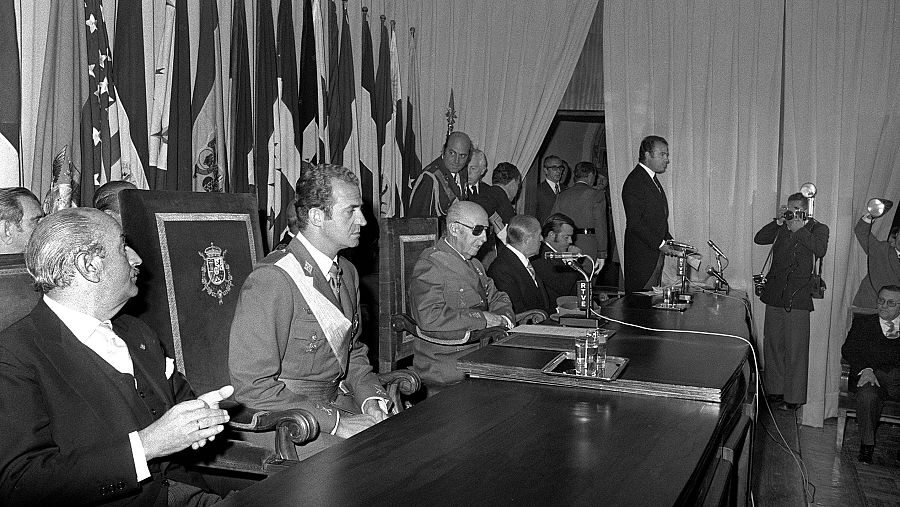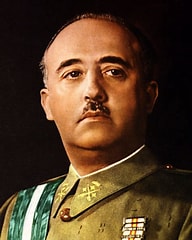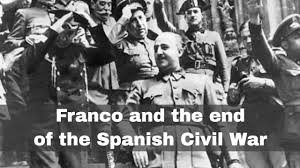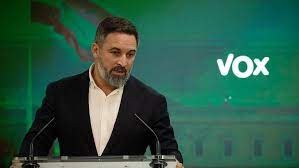 Today is the 50th anniversary of the death of the Spanish dictator General Franco.
Today is the 50th anniversary of the death of the Spanish dictator General Franco.
On November 20th November 1975 it was announced that the man who had ruled Spain with an iron fist for 38 years had passed away in his sleep.
The Spanish Press announces Franco's death [Photo composition: X]
Franco had been in charge since the military coup which toppled the elected Republican government of the day and led to a bloody civil war (1936-1939).
The conflict and its aftermath claimed en estimated 500,000 lives.
What the Press and media are saying
 According to the national broadcaster rtve.es Spain passed from being an authoritarian regime to a full democracy, where freedom of expression, equality and diversity are an integral part of daily life.
According to the national broadcaster rtve.es Spain passed from being an authoritarian regime to a full democracy, where freedom of expression, equality and diversity are an integral part of daily life.
The dictatorship was characterised by political and cultural repression, a lack of freedom of speech and the persecution of dissidents.
Franco's death marked the end of this time and the beginning of a new political era which culminated in the approval of a new constitution in 1978 and the consolidation of democracy in Spain.
[Instituto Cervantes]
Yet today there is a generation of young people who identify with Francoist principles and defend the regime.
Some experts claim that young people "lack solid and verified information and knowledge" about Francoism.
Radio Nacional de España (RNE) posed the question: What is left of Franco after 50 years?
 Their reporter Mar Lupion wrote earlier today on Facebook that vestiges of Francosism are alive and well in Spanish society.
Their reporter Mar Lupion wrote earlier today on Facebook that vestiges of Francosism are alive and well in Spanish society.
According to the Centro de Investigaciones Sociológicas (CIS), about 20% of Spaniards between the ages of 18 and 24 consider the dictatorship to have been "good or very good".
This nostalgia for a historical period they didn't experience can be explained by several factors.
[Photo courtesy of Wikipedia]
Alina Danet, a sociologist and professor of Political Science at the University of Granada, maintains that young people "lack solid and reliable information and knowledge" about the Franco regime. This is because, after Franco's death, the dictatorship was "little discussed" in Spain.
Furthermore, young people feel that their generation has suffered a loss of status compared to their parents and grandparents.
Social media acts as a catalyst for the spread of hoaxes and myths about the Franco regime through trends that use elements of contemporary culture, such as memes, music, and manipulated videos, in a phenomenon known as "pop fascism".
Within this breeding ground, "historical revisionism" - the movement that revisits the dictatorship with the collaboration of journalists, essayists, and historians - plays a pre-eminent role.
Franco, from renowned military man to dictator for almost 40 years

Franco died on November 20, 1975, and was succeeded two days later by King Juan Carlos I, who assumed all the powers of the State:
He was head of government, head of state, and commander-in-chief of the Armed Forces.
Last ever photo of Franco 12 Oct 1975 [EFE/SVB]. To his right is Don Juan Carlos de Borbon, Franco's nominated successor
Mª Carmen Cruz Martín explains: "With the victory of the so-called Nationalists, Francisco Franco established a military dictatorship in Spain and ruled the country with an iron fist for almost four decades, between 1939 and 1975."
Who was Francisco Franco?
 Francisco Franco Bahamonde was head of state until the day of his death, on November 20, 1975; head of government until 1973, when he handed over that baton of command to Carlos Arias Navarro, and commander-in-chief of the Armed Forces.
Francisco Franco Bahamonde was head of state until the day of his death, on November 20, 1975; head of government until 1973, when he handed over that baton of command to Carlos Arias Navarro, and commander-in-chief of the Armed Forces.
On coins of that era, he was depicted as "Leader of Spain by the Grace of God."
[Photo: The Daily Mail]
He was part of the military leadership that staged the 1936 coup against the government of the Second Republic, which subsequently led to the Civil War.
For three years, Spain was embroiled in a conflict that divided the country into two factions. With the victory of the Nationalist faction on April 1, 1939, Franco took over all state powers.
Military Career
 Born in Ferrol (A Coruña) in 1892 into a middle-class family, Francisco Franco was the second of five children.
Born in Ferrol (A Coruña) in 1892 into a middle-class family, Francisco Franco was the second of five children.
Following in his father's military footsteps, Franco entered the Infantry Academy of Toledo in 1907.
His military career was marked by the Rif War in Morocco, where he was stationed between 1912 and 1926.
He was head of the Legion, and in 1926 he was promoted to Brigadier General, becoming the youngest general in Europe. In 1935, he was appointed Chief of the General Staff.
[Photo: Wikipedia]
Following the Popular Front's victory in the February 1936 elections, the government removed generals suspected of plotting a coup, and Franco was subsequently assigned to the Canary Islands.
In July 1936, he joined the coup d'état known as the National Uprising, led by Generals José Sanjurjo and Emilio Mola, who were dissatisfied with the Second Republic and desired a more conservative and religious Spain.
The coup d'état began when the military garrisons of Ceuta, Melilla, and Tetouan rebelled against the Second Republic.
Although the coup failed in cities like Madrid and Barcelona, a Civil War ensued with two sides: the Republicans - defenders of the Republic and comprised of left-wing parties - and the rebels, also known as the Nationalists - made up of right-wing parties, the bourgeoisie, and anti-republican military officers.
More than half a million people from both sides would die in the conflict.
Soon, Franco became the leader of the rebels, and on October 1, 1936, he was proclaimed head of state and caudillo (leader) of Spain.

[Youtube]
 The Civil War in Spain served as a rehearsal for the Axis powers for World War II. Franco's side received support from Adolf Hitler's Nazi Germany and Benito Mussolini's Fascist Italy, which helped Franco to achieve significant victories in key battles.
The Civil War in Spain served as a rehearsal for the Axis powers for World War II. Franco's side received support from Adolf Hitler's Nazi Germany and Benito Mussolini's Fascist Italy, which helped Franco to achieve significant victories in key battles.
Mussolini, Franco and Hitler [La Hora Digital]
[Ed: the bombing by the German Luftwaffe of Guernica near Bilbao being the best example]
Finally, on April 1, 1939, Franco announced from the city of Burgos that the war had ended after having "defeated the Red Army" and "the nationalist troops having achieved their final military objectives".
The Franco Dictatorship
At the end of the Civil War, Franco took over all the powers of the State and established a military dictatorship, characterized by censorship and repression of those who were against the new regime, the curtailment of rights and freedoms, total control of the State and a policy of international isolation during the first years of his government.
 Precisely because of this international isolation and the economic difficulties the country faced in the postwar period, the early years of the dictatorship were marked by famine. To confront the economic crisis, an autocratic regime was established, an economic system based on an attempt at self-sufficiency.
Precisely because of this international isolation and the economic difficulties the country faced in the postwar period, the early years of the dictatorship were marked by famine. To confront the economic crisis, an autocratic regime was established, an economic system based on an attempt at self-sufficiency.
Post-war hunger [The Olive Press]
However, food shortages were widespread, and in response, a rationing system was introduced to control available food and prevent hoarding. Each person was allocated a specific quantity of products.
 So, on May 14, 1939, the Franco regime pioneered the ration book, which specified the quantity and type of goods to which each Spaniard was entitled. This system remained in place until June 1, 1952.
So, on May 14, 1939, the Franco regime pioneered the ration book, which specified the quantity and type of goods to which each Spaniard was entitled. This system remained in place until June 1, 1952.
Alongside the economic problems, the repression against the defeated led many people to go into exile abroad. Those who remained in the country and did not support Franco's regime began to suffer harsh controls. Many were imprisoned, and many others were executed.
Spanish post-Civil War ration book [Dreamstime]
In fact, Franco's regime was signing death warrants until very shortly before the dictator's death. Less than two months before Franco died, five members of the Basque Terrorist Group ETA (Euskadi Ta Askatasuna) and the communist FRAP (Frente Revolucionario Antifascista y Patriota) were executed.
Political parties were banned, and only the Falange Española Tradicionalista and the Juntas de Ofensiva Nacional Sindicalista (FET y de las JONS) were permitted. Linguistic and sexual diversity were persecuted, and women lost rights they enjoyed during the Republic, as they were required to be under "male guardianship" during the Franco regime.
Franco's dictatorship was heavily influenced by Catholicism, and the Church played a significant role in the regime.
And although Spain declared itself neutral in World War II, Franco had a close relationship with Hitler and Mussolini.
Precisely because of this proximity to European fascist regimes, Spain found itself isolated internationally after the end of World War II.
During the Cold War, it managed to partially emerge from this isolation thanks to its rapprochement with the Western bloc and because of its opposition to the Soviet bloc.
The Succession
And although Francoism began its decline on November 20, 1975,  with the death of the dictator, its end had begun to take shape years earlier.
with the death of the dictator, its end had begun to take shape years earlier.
In 1969, Franco had named as his successor the Infante Juan Carlos - who would later become King Juan Carlos I - son of the legitimate heir to the throne, Don Juan de Borbón, and grandson of the late Alfonso XIII, the last monarch before the Second Republic.
The young Juan Carlos [Getty Images]
With his oath before the Cortes, Juan Carlos became Prince of Spain on July 22, 1969.
In June 1973, Franco appointed Admiral Luis Carrero Blanco as head of the government, but in December of that same year, he was assassinated in an ETA attack in Madrid.
Finally, the dictator decided to appoint Carlos Arias Navarro as Prime Minister.
In the months leading up to his death, Franco suffered from various illnesses. While he was ill, on a couple of occasions, Juan Carlos assumed the role of Acting Head of State. The first was on July 9, 1974, when the dictator was hospitalized for treatment of phlebitis. The second was in October 1975, after Franco fell ill and suffered several heart attacks until he finally died on November 20.
 King Juan Carlos was sworn in before the Cortes on November 22. Following Franco's death, Spain underwent a period known as the Transition, which led the country to become a parliamentary monarchy, hold its first democratic elections in over 40 years in 1977, and adopt a Constitution in 1978.
King Juan Carlos was sworn in before the Cortes on November 22. Following Franco's death, Spain underwent a period known as the Transition, which led the country to become a parliamentary monarchy, hold its first democratic elections in over 40 years in 1977, and adopt a Constitution in 1978.
Juan Carlos is sworn in as king [Wikipedia]
Last Word
I have strong feelings about Franco. When I first came to Spain in 1970, to San Sebastian (Gipuzkoa) I fell in love with the country, the people and the lifestyle, despite Franco still being in control.
I studied Spanish to honours degree level and obviously got to learn more about Franco's murderous and vindictive regime.
I despise the man and what he stood for. He is arguably as bad as Hitler and Mussolini were, yet he was the only one of that deadly trio who died a natural death. Hitler committed suicide in his Berlin bunker and Mussolini was strung up by his own people.
I find it right that Franco has been thoroughly discredited and that the Spanish government is trying to erase all traces of him.
"Franco is dead!" Let's leave it at that!
 But Spain needs to be wary of VOX, the right wing extremist party, and the ridiculous behaviour of many young Spaniards in wishing for a return to an evil, repressive Spain that they never knew! Spain was NOT better under Franco!
But Spain needs to be wary of VOX, the right wing extremist party, and the ridiculous behaviour of many young Spaniards in wishing for a return to an evil, repressive Spain that they never knew! Spain was NOT better under Franco!
Santiago Abascal of VOX [Photo: VOX]
© The History Man
Photos:
ABC, BBC, Diario de Sevilla, Dreamstime, Getty Images, Instituto Cervantes, La Hora Digital, SVB, The Guardian, The Olive Press, Wikipedia, Youtube, VOX, X
Acknowledgements:
Sources: Alina Danet, EFE, Mª Carmen Cruz Martín, Mar Lupion, MSN, Paul Whitelock, RNE, rtve.es, Wikipedia
Translations: Paul Whitelock
Tags:
1936-1939, 1978, 500,000 lives, ABC, Adolf Hitler, Alina Danet, authoritarian regime, Benito Mussolini, bloody civil war, BBC, CIS, Centro de Investigaciones Sociológicas, constitution, democracy, Diario de Sevilla, dictatorship, diversity, Dreamstime, EFE, equality, Francoism, Francoist, freedom of expression, freedom of speech, full military coup, Getty Images, "historical revisionism", Instituto Cervantes, La Hora Digital, Mª Carmen Cruz Martín, Mar Lupion, MSN, Paul Whitelock, persecution of dissidents, political and cultural repression, "pop fascism", professor of Political Science, RNE, Radio Nacional de España, Republican government, sociologist, SVB, The Guardian, The Olive Press, University of Granada, Wikipedia, Youtube, VOX, X